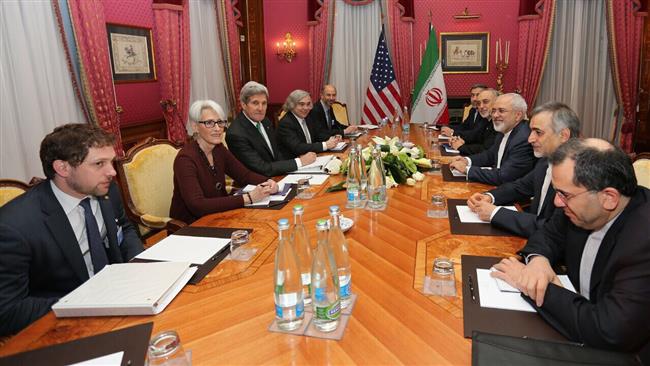 Iranian nuclear negotiators, headed by Foreign Minister Mohammad Javad Zarif, (3rd R) meet the US delegates, headed by Secretary of State John Kerry (3rd L) in the Swiss city of Lusanne, March 17, 2015.[/caption]
Iranian nuclear negotiators, headed by Foreign Minister Mohammad Javad Zarif, (3rd R) meet the US delegates, headed by Secretary of State John Kerry (3rd L) in the Swiss city of Lusanne, March 17, 2015.[/caption]LAUSANNE, Switzerland ��Iran�and the United States issued contrasting assessments Tuesday on their progress toward an agreement to limit�Iran�snuclear program�as Energy Secretary Ernest J. Moniz met here with his Iranian counterpart.
In comments to the Iranian news media, Ali Akbar Salehi, the head of the Atomic Energy Organization of Iran, said that 90 percent of the technical issues had been worked out. Mr. Salehi said he hoped to resolve a remaining �point of difference� in a meeting Tuesday afternoon with Mr. Moniz.
A senior American official was far more cautious in comments to reporters Tuesday morning.
�We have definitely made progress in terms of identifying technical options for each of the major areas,� said the official, who declined to be identified by name under the protocol for briefing reporters.
�There is no way around it: We still have a ways to go,� the official added. �Even within this space, we have some tough issues to address.�
The two sides are trying to meet a deadline of the end of March for completing the outlines of an agreement to limit Iran�s�nuclear program�in exchange for removing sanctions.
That agreement would have �quantitative dimensions,� the American official said, and would not be a mere list of broad principles. That would set the stage for finishing a detailed, comprehensive accord between six world powers and Iran by the end of June.
The clashing Iranian and American statements may be partly a matter of tactics. By describing the agreement as virtually at hand, the Iranians may be trying to build public pressure on the United States and its European partners to make concessions on remaining issues, which include what sort of restrictions should be placed on the research and development of advanced centrifuges, the�difficult question of how quickly sanctions would be lifted, and what sort of far-reaching verification measures would be put in place.
American officials, who have generally been careful with pronouncements, know that they will need to defend the accord to a skeptical Congress and outside experts who suspect Iran wants the ability to produce weapons. Iranian officials have repeatedly said their nuclear work is for purely civilian purposes.
The Obama administration has said that its goal is to increase to one year the amount of time it would take for Iran to develop enough material for a nuclear weapon if it decided to �break out� of an accord. The provisions to ensure a one-year �breakout� time would be in effect for at least 10 years of what is expected to be a 15-year agreement, American officials have said.
Pressing to meet the negotiating deadline, Secretary of State John Kerry and Mohammad Javad Zarif, the Iranian foreign minister, met for about six hours Tuesday, along with their aides. But the contrasting statements highlighted the increasingly important roles that Mr. Moniz and Mr. Salehi have come to play in the negotiations.
Mr. Moniz and Mr. Salehi overlapped during their days at the Massachusetts Institute of Technology, though they never met there. Mr. Moniz taught at M.I.T. and eventually led its physics department, while Mr. Salehi, who speaks fluent English, earned his doctorate there in nuclear engineering.
When Iran proposed that Mr. Salehi join the negotiations two rounds ago, the Obama administration decided to include Mr. Moniz.
As the head of Iran�s nuclear energy organization, Mr. Salehi has a powerful interest in preserving the nuclear infrastructure that the United States is seeking to limit. But American officials say that the discussions between Mr. Moniz and Mr. Salehi have been professional and have helped sharpen the deliberations over highly technical issues.
The two have held about a dozen one-on-one meetings, including two on Tuesday.
�He is a hard-liner and has been vehement about protecting Iran�s ability to have advanced centrifuges,� said David Albright, the president of the Institute for Science and International Security, a research center that has done extensive analysis of the Iranian nuclear program.
�But he appears to be the key guy that Iran�s supreme leader goes to on nuclear issues,� Mr. Albright added. �So it is better to have him in the negotiations than outside of it.�
By The New York Times










